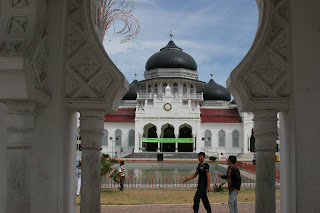The other night, GenAssist threw a huge party at one of the universities here in Aceh. 500 or so people showed up, the governor of the region, the mayor, other important government o
When disasters hit an area, they tend to hit the news headlines pretty hard too. We probably all remember the Tsunmai, the massive earthquake in China, the chemical explosion in India some years ago, Chernobyl. But once the headlines fade away, so do our thoughts of the event.
This celebration was a powerful reminder that tragedies linger. For years. For the people of Aceh, the Tsunami will not be a distant memory for the next few generations. You can’t drive very far through this city without seeing a monument, a plaque, an escape building, a mass grave, and be reminded that this Tsunami was for the people of Aceh what Hiroshima/Nagasaki was for the Japanese a few generations ago. It forever changed them.
Seeing that celebration also made me realize that organizations that go in, claim the limelight while it’s there, then leave, would be better off never showing up in the first place. It’s quite possible that they do more harm than good.

CRWRC goes in for the long haul. They stick it out until the job is done, or at least until the infrastructure and talent is in place to keep things moving toward restoration.
Here in Aceh, they’ve built houses, trained thousands of people to have new livelihoods, worked with government leaders, and are leaving a very qualified and gifted group of people behind to tie up any loose ends in the months and years to come.
So even though the headlines left years ago, and our memories faded fast on the devastation of this Tsunami, my little blog is one attempt to bring to light the fact that this tragedy isn’t over yet. For the people of Aceh, it’s a daily reality. For CRWRC, it’s now a job well done.
As a footnote, CRWRC has just applied for a large grant to help them get started in Southern Sudan where a tsunami of war, violence, starvation and, dare we say it? Genocide? is under way. It will be interesting to see how long they stay there after the headlines fade away.
I suspect they’ll be there awhile.


